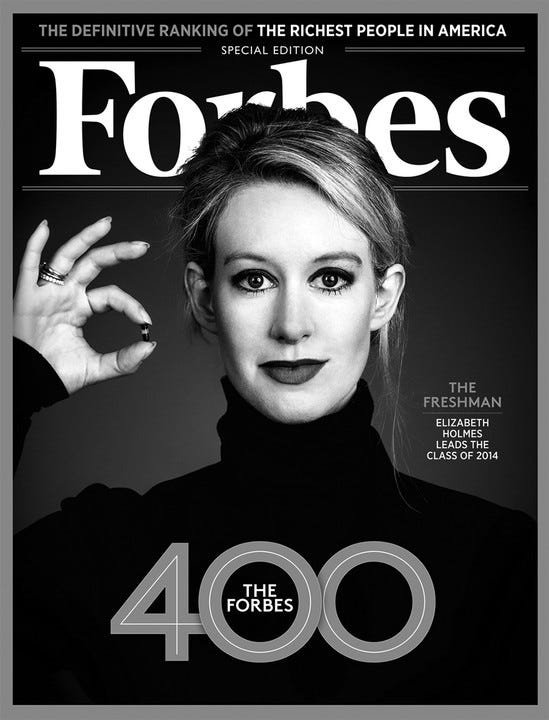Fall of a Unicorn
In all the time I’ve known you I still don’t know what you mean
The weekend at the college didn’t turn out like you planned
The things that pass for knowledge I can’t understand
Steely Dan, Reelin’ In The Years
It’s a sad story what happened to Ms. Holmes. Sad in the sense that I wish the fraudulent claims about Theranos’ technology had in fact been true. What I don’t understand are Ms. Holmes’ true motives. Did she want to transform the way blood tests were performed and analyzed, to improve accuracy, reduce the cost, save lives? Did she only want to get rich? Did she overfeed on vanity and praise bestowed on her by those in her entrepreneurial orbit, some who thought she may be the next Steve Jobs? (The black turtle neck and hypnotic stare make the comparison hard to avoid). In other words, was she merely a victim of a runaway ego? When you lure otherwise very smart people to invest tens of millions of dollars in what you know is fairy dust, maybe you eventually come to believe it too.
A short review of Ms. Holmes ascent to tech stardom. In 2002, at age eighteen, she attended Standford University, nominally to study the Mandarin language, but she also dabbled in chemical engineering only to drop out in 2004 to open a healthcare technology company, which she later renamed Theranos (a portmanteau of Therapy and Diagnose). OK, so, fluent in a foreign language – check. Has the academic chops to study chemical engineering at Standford (where I assume she did well) – check. Has a good pedigree, i.e. smart parents and entrepreneurial ancestors – check. Has gained the confidence of a full professor of chemical engineering (also Standford) that her invention is going to transform healthcare forever – check. In short order she becomes the darling of venture capitalists – check. Who, by 2010, had invested $92 million in Theranos, where Ms. Holmes was the CEO – check, check. Not too shabby for eight years of effort!
By 2014, Theranos was valued at over $9 billion, way more than enough to join the Unicorn Club. Even less shabby for twelve years of work!
And then the bubble sprung a leak. The transformative technology Ms. Holmes duped investors into believing Thernanos had (and, to be fair, others were in on the dupe – her ex-boyfriend and co-worker has also been indicted for fraud) was all smoke ‘n mirrors. A special pin inside a tiny plastic capsule (the “nanoliter”) would draw a single drop of blood from a patient’s finger that would then be swiftly analyzed by Theranos’ proprietary software called “Edison.” Supposedly, Edison could detect and measure the levels of all kinds of bio-molecules (sugars, proteins, enzyme products, etc.), maybe even cancer biomarkers! This last being the holy grail of any number of biotech startups. Think “Cologuard” here. Maybe you want to know if you have colorectal cancer. Sure. But why push a camera up your butt and take biopsies when you can simply poop in a cup instead. Better yet, instead of poop, Theranos only needed a nanoliter of your blood. And then, Ms. Holmes said with the voice of a sage, software would do the rest.
Well, turns out, the most of the patients subject to the Theranos “tech” did not, in fact, have their blood drawn by the nanoliter, it was was drawn with a conventional syringe. And then most of samples had to be diluted to increase volume so as to be useful for analysis on a conventional blood analyzer, not Edison. The small percentage of samples that were analyzed by Edison gave irregular values and showed serious problems with reproducibility. The so-called transformative technology Ms. Holmes had been describing to investors for years (and patients as well) was fiction.
I agree with one reporter who was disappointed the jury did not find Ms. Holmes guilty of defrauding patients, only the investors. More than a few patients named in the lawsuit were told they had a medical condition based on a Theranos test when in fact they didn’t. Sure, even conventional, well-vetted medical tests can be wrong (false & negative positives), and patients have the right to be angry and sue, but being told the underlying technology of your test is as good as the current standard, or better, when in fact it was BS seems to me a quantum leap in criminal misconduct. But then again I’m pretty cynical toward the law in general, plus I wasn’t privy to the facts of this case as testified to in court. In any case, Ms. Holmes is likely facing many years behind bars for the three counts on which the jury found her guilty. Sentencing is scheduled for September.
…
Not so long ago I was a vice president at a biotech startup, albeit an embryonic one much smaller than Theranos. I presented our technology at conferences and to scientists at pharmaceutical companies (we also won an NIH grant). I tried to convince would-be customers (not VCs) to invest in our solution for discovering novel biomarkers of human disease. We did OK for a few years, financially speaking, especially given we were a small startup. Eventually we had to close up shop, for a variety of reasons. But it wasn’t because the company principals (myself included) were ignominiously dragged into court with our tails between our legs. I may never have achieved the status of “player” in biotech but I’m also not facing ten years (or more) in jail. Moral of the story: Tell the truth. Ms. Holmes would have done well to add that to her list of self-improvement notes on hotel stationary. Not trying to sound morally superior, just sayin’. Certain words of wisdom are eternal.

